- Home
- Frank Herbert
The Collected Stories of Frank Herbert Page 3
The Collected Stories of Frank Herbert Read online
Page 3
“Precisely!” Paul exhaled the word.
“What did you say?” she asked.
“I said, ‘Precisely!’”
Paul turned toward her and rested his left elbow on the dressing table. “Because,” he said, “at the very moment I was telling you what you would do when you awakened, at the moment I was giving you the commands which resulted in your hallucination, I got the same idea.”
“My goodness!” she said. The very mildness of her exclamation made it seem more vehement than if she had sworn.
Paul turned back to the dressing table mirror. “I wonder if there could be something in telepathy as well?”
Miss Walker looked at him in the mirror, the room seeming to draw in closely behind her. “It was an idea I couldn’t keep to myself,” she said. “I told my friends—I came with a married couple—but they just laughed at me. I decided on the spur of the moment to come back here and talk to you and I did it before I could lose my nerve. After all, you’re a hypnotist. You should know something about this.”
“It’ll take some looking into,” Paul said, “I wonder…” He turned toward Miss Walker. “Are you engaged tonight?”
Her expression changed. She looked at him as though her mother were whispering in her ear: “Watch out! Watch out! He’s a man.”
“Well, I don’t know…” she said.
Paul got on his most winning smile. “I’m no backstage wolf,” he said. “Please, I feel as though somebody had asked me to cut the Gordian knot, and I’d rather untie it—but I need help.”
“What could we do?” she asked.
It was Paul’s turn to hesitate. “There are several ways to approach the problem,” he said. “We in America have only scratched the surface in our study of hypnotism.” He doubled up his fist and thudded it gently on the dressing table. “Hell! I’ve seen witch doctors in Haiti who know more about it than I do. But…”
“What would you do first?” she asked.
“I’d … I’d…” Paul looked at her for a moment as though he really saw her for the first time. “I’d do this,” he said. “Make yourself comfortable on that settee. Lean back. That’s it.”
“What are you going to do?” she asked.
“Well,” Paul said, “It’s pretty well established that these sensory hallucinations are centered in one part of the human nervous system which is laid bare by hypnotism. It’s possible, by using hypnotism, to get at the commands other hypnotists have put there. I’m going to put you back in deep trance and let you search for the commands yourself. If something is commanding us to live an illusion, the command should be right there with all the others.”
“I don’t know,” she said.
“Please,” Paul urged. “We might be able to crack this thing right here and now in just a few minutes.”
“All right.” She still sounded hesitant, but she leaned back as directed.
Paul lifted his paste gem from the dressing table and focused the table spotlight on it. “Look at the diamond,” he said.…
This time she fell into the trance more readily. Paul checked her for pain threshold, muscular control. She responded appropriately. He began questioning:
“Do you hear my voice?”
“Yes,” she said.
“Do you know what hypnotic commands are in your mind?” he asked.
There was a long pause. Her lips opened dryly. “There are … commands,” she said.
“Do you obey them?” he asked.
“I must.”
“What is the most basic of these commands?” he asked.
“I … can … not … tell.”
Paul almost rubbed his hands. A simple ‘Don’t talk about it,’ he thought.
“Just nod your head if I repeat the command,” he said. “Does it say, ‘You must not tell’?”
Her head nodded.
Paul rubbed his hands against his pants legs and realized suddenly that he was perspiring excessively.
“What is it you must not tell?” he asked.
She shook her head without speaking.
“You must tell me,” he said. “If you do not tell me, your right foot will begin to burn and itch unbearably and will continue to do so until you do tell me. Tell me what it is that you have been commanded not to tell.”
Again she shook her head. She reached down and began to scratch her right foot. She pulled off her shoe.
“You must tell me,” Paul said. “What is the first word of the command?”
The girl looked up at him, but her eyes remained unfocused.
“You…” she said.
It was as though she had brought the word from some dark place deep within her and the saying of it was almost too much to bear. She continued to scratch her right leg.
“What is the second word?” Paul asked.
She tried to speak, but failed.
“Is it ‘must’?” he asked. “Nod your head if it is.”
She nodded her head.
“You ‘must’ what?”
Again she was wordless.
He thought about it for a moment. “Sensory perception,” he thought. He leaned forward. “Is it ‘You must sense…’?” he asked. “Is it ‘You must sense only…’?”
She relaxed. Her head nodded and she said, “Yes.”
Paul took a deep breath.
“What is it ‘You must sense only…’?” he asked.
She opened her mouth, her lips moved, but no sound issued.
He felt like screaming at her, dragging the answer from her mind with his hands.
“What is it?” His voice cracked on the question. “Tell me!”
She shook her head from side to side. He noticed signs of awakening.
Again he took a deep breath. “What will happen to you if you tell me?”
“I’ll die,” she said.
He leaned forward and lowered his voice to a confidential tone. “That is foolishness,” he said. “You can’t die just because you say a few words. You know that. Now tell me what it is that you have been ordered to sense.”
She stared straight ahead of her at nothing, mouth open. Paul lowered his head to look directly into her eyes. “Do you see me?” he asked.
“No,” she said.
“What do you see?” he asked.
“I see death.”
“Look at me instead,” Paul said. “You remember me.”
“You are death,” she said.
“That’s nonsense! Look at me,” he commanded.
Her eyes opened wider. Paul stared into them. Her eyes seemed to grow and grow and grow and grow … Paul found himself unable to look away. There was nothing else in the world except two blue-gray eyes. A deep, resonant voice, like a low-register cello, filled his mind.
“You will forget everything that has happened tonight,” it said. “You will die rather than remember. You will, you must, sense only those things which you have been commanded to sense. I, ______, command it. Do you remember me?”
Paul’s lips formed the word, “yes.”
“Who am I?” the voice asked.
Paul dampened his dry lips with his tongue. “You are death,” he said.
* * *
Bureaucracy has a kind of timeless, raceless mold which makes its communiques recognizable as to type by the members of any bureau anywhere. The multiple copies, the precise wording to cover devious intent, the absolute protocol of address—all are of a pattern, whether the communication is to the Reconstruction Finance Corporation or the Denebian Bureau of Indoctrination.
Mirsar Wees knew the pattern as another instinct. He had been supervisor of indoctrination and overseer of the korad farming on Sol III for one hundred and fifty-seven of the planet’s years. In that time, by faithfully following the letter of the Indoctrination Bureau’s code and never an individual interpretation of its spirit, he had insured for himself a promotion to Coordinator of the entire Sol prefecture whenever such an opening occurred.
Having met another threat to
his position and resolved it, knowing the security of his tenure, he sat before the mechanical secretary-transmitter in his office and dictated a letter to the Bureau. The vision-ring around his head glowed a dull amber as he relaxed the receptors in it. His body stretched out comfortably, taking a gentle massage from the chair.
“There has been considerable carelessness lately with the training of neo-indoctrinators,” he said into the communo-tube.
Let a few heads fall at the bureau, he thought.
“There seems to be a feeling that, because we of the Sol prefecture are dealing with lesser beings, a lesser amount of care need be taken with the prefecture’s indoctrinators. I have just dealt with a first-order threat to the Sol III korad supply, a threat which was directly attributable to neo-indoctrinator carelessness. A deviant was allowed to pass through the hands of three of our latest acquisitions from the College of Indoctrinators. These indoctrinators have been sent back for retraining.”
He thought in satisfaction: They will reflect that the korad secreted by the glands of our charges is necessary for their own immortality, and will be more severe at the training center because of that. And pensively: It is almost time for me to tell them of our breeding experiments to bring the korad glands to the exterior of these creatures, making more frequent draining possible. They will particularly appreciate the niceties of indoctrination—increasing the mating pattern, increasing individual peril and, thereby, the longevity gland secretion, and the more strict visual limitation to keep the creatures from discovering the change.…
“I am sending a complete visio-corder report on how I met this threat,” he spoke into the tube. “Briefly, I insinuated myself into the earth-being’s presence and installed a more severe command. Standard procedure. It was not deemed practical to eliminate the creature because of the latest interpretations on command interference; it was felt that the being’s elimination might set off further thought-patterns inimical to our designs.
“The creature was, therefore, commanded to mate with another of its ilk who is more stringently under our control. The creature also was removed from any labor involving the higher nerve-centers and has been put to another task, that of operating a transportation device called a streetcar.
“The mate has been subjected to the amputation of an appendage. Unfortunately, before I could take action, the creature I treated had started along an exceedingly clever line of action and had installed irremovable commands which made the appendage useless.”
They will see how much of a deviant the creature was, he thought, and how careless the new indoctrinators were.
“The indoctrinator service must keep in mind at all times what happened to create the Sol plantoid belt. Those bodies, as we all know, once were the planet Dirad, the greatest korad source in the entire galaxy. Slipshod procedure employed by indoctrinators set up a situation similar to the one I have just nipped, and we were forced to destroy the entire planet. The potency of minds which have slipped from our control should be kept constantly before our attention. Dirad is an object lesson.
“The situation here is again completely normal, of course, and the korad supply is safe. We can go on draining the immortality of others—but only as long as we maintain constant vigilance.”
He signed it, “Cordially, Mirsar Wees, Chief Indoctrinator, Sol Sub-prefecture.”
Someday, he thought, it will be “Coordinator.”
Rising from the mechano-secretary, Mirsar Wees moved over to the “incoming” tube of his report-panel and noticed a tube which his new assistant had tabbed with the yellow band of “extreme importance.”
He inserted the tube into a translator, sat down, and watched as it dealt out the report:
“A Hindu creature has seen itself as it really is,” the report said.
Mirsar Wees reached over and put a tracer-beam on his new assistant to observe how that worthy was meeting this threat.
The report buzzed on: “The creature went insane as per indoctrination command, but most unfortunately it is a member of a sect which worships insanity. Others are beginning to listen to its babblings.”
The report concluded: “I make haste.”
Mirsar Wees leaned back, relaxed and smiled blandly. The new assistant showed promise.
OPERATION SYNDROME
Honolulu is quiet, the dead buried, the rubble of buildings cleaned away. A salvage barge rocks in the Pacific swell off Diamond Head. Divers follow a bubble trail down into the green water to the wreck of the Stateside skytrain. The Scramble Syndrome did this. Ashore, in converted barracks, psychologists work fruitlessly in the aftermath of insanity. This is where the Scramble Syndrome started: one minute the city was peaceful; a clock tick later the city was mad.
In forty days—nine cities infected.
The twentieth century’s Black Plague.
Seattle
First a ringing in the ears, fluting up to a whistle. The whistle became the warning blast of a nightmare train roaring clackety-clack, clackety-clack across his dream.
A psychoanalyst might have enjoyed the dream as a clinical study. This psychoanalyst was not studying the dream; he was having it. He clutched the sheet around his neck, twisted silently on the bed, drawing his knees under his chin.
The train whistle modulated into the contralto of an expensive chanteuse singing “Insane Crazy Blues.” The dream carried vibrations of fear and wildness.
“A million dollars don’t mean a thing—”
Hoarse voice riding over clarion brass, bumping of drums, clarinet squealing like an angry horse.
A dark-skinned singer with electric blue eyes and dressed in black stepped away from a red backdrop. She opened her arms to an unseen audience. The singer, the backdrop lurched into motion, revolving faster and faster and faster until it merged into a pinpoint of red light. The red light dilated to the bell mouth of a trumpet sustaining a minor note.
The music shrilled; it was a knife, cutting his brain.
Dr. Eric Ladde awoke. He breathed rapidly; he oozed perspiration. Still he heard the singer, the music.
I’m dreaming that I’m awake, he thought.
He peeled off the top sheet, slipped his feet out, put them on the warm floor. Presently, he stood up, walked to the window, looked down on the moontrail shimmering across Lake Washington. He touched the sound switch beside the window and now he could hear the night—crickets, spring peepers at the lakeshore, the far hum of a skytrain.
The singing remained.
He swayed, gripped at the windowsill.
Scramble Syndrome—
He turned, examined the bedside newstape; no mention of Seattle. Perhaps he was safe—illness. But the music inside his head was no illness.
He made a desperate clutch for self-control, shook his head, banged his ear with the palm of his hand. The singing persisted. He looked to the bedside clock—1:05 A.M., Friday, May 14, 1999.
Inside his head the music stopped. But now—Applause! A roar of clapping, cries, stamping of feet. Eric rubbed his head.
I’m not insane … I’m not insane—
He slipped into his dressing gown, went into the kitchen cubicle of his bachelor residence. He drank water, yawned, held his breath—anything to drive away the noise, now a chicken-haggle of talking, clinking, slithering of feet.
He made himself a highball, splashed the drink at the back of his throat. The sounds inside his head turned off. Eric looked at the empty glass in his hand, shook his head.
A new specific for insanity—alcohol! He smiled wryly. And every day I tell my patients that drinking is no solution. He tasted a bitter thought: Maybe I should have joined that therapy team, not stayed here trying to create a machine to cure the insane. If only they hadn’t laughed at me—
He moved a fibreboard box to make room beside the sink, put down his glass. A notebook protruded from the box, sitting atop a mound of electronic parts. He picked up the notebook, stared at his own familiar block printing on the cover: Amanti Teleprobe—T
est Book IX.
They laughed at the old doctor, too, he thought. Laughed him right into an asylum. Maybe that’s where I’m headed—along with everyone else in the world.
He opened the notebook, traced his finger along the diagram of his latest experimental circuit. The teleprobe in his basement laboratory still carried the wiring, partially dismantled.
What was wrong with it?
He closed the notebook, tossed it back into the box. His thoughts hunted through the theories stored in his mind, the knowledge saved from a thousand failures. Fatigue and despondency pulled at him. Yet, he knew that the things Freud, Jung, Adler and all the others had sought in dreams and mannerisms hovered just beyond his awareness in an electronic tracer circuit.
He wandered back into his study-bedroom, crawled into the bed. He practiced yoga breathing until sleep washed over him. The singer, the train, the whistle did not return.
* * *
Morning lighted the bedroom. He awoke, trailing fragments of his nightmare into consciousness, aware that his appointment book was blank until ten o’clock. The bedside newstape offered a long selection of stories, most headed “Scramble Syndrome.” He punched code letters for eight items, flipped the machine to audio and listened to the news while dressing.
Memory of his nightmare nagged at him. He wondered, “How many people awake in the night, asking themselves, ‘Is it my turn now?’”
He selected a mauve cape, drew it over his white coveralls. Retrieving the notebook from the box in the kitchen, he stepped out into the chill spring morning. He turned up the temperature adjustment of his coveralls. The unitube whisked him to the Elliott Bay waterfront. He ate at a seafood restaurant, the teleprobe notebook open beside his plate. After breakfast, he found an empty bench outside facing the bay, sat down, opened the notebook. He found himself reluctant to study the diagrams, stared out at the bay.
Mists curled from the gray water, obscuring the opposite shore. Somewhere in the drift a purse seiner sounded its hooter. Echoes bounced off the buildings behind him. Early workers hurried past, voices stilled: thin look of faces, hunted glances—the uniform of fear. Coldness from the bench seeped through his clothing. He shivered, drew a deep breath of the salt air. The breeze off the bay carried essence of seaweed, harmonic on the dominant bitter musk of a city’s effluvia. Seagulls haggled over a morsel in the tide rip. The papers on his lap fluttered. He held them down with one hand, watching the people.

 Direct Descent
Direct Descent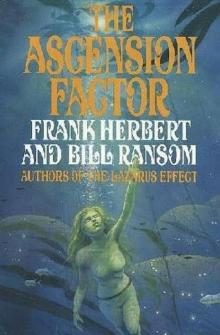 The Ascension Factor
The Ascension Factor The Heaven Makers
The Heaven Makers Children of Dune
Children of Dune Old Rambling House
Old Rambling House Dune
Dune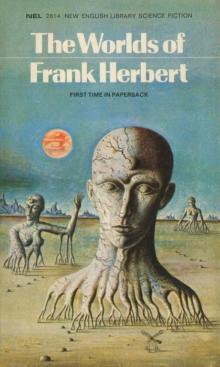 The Worlds of Frank Herbert
The Worlds of Frank Herbert The Jesus Incident
The Jesus Incident Heretics of Dune
Heretics of Dune Whipping Star
Whipping Star Dune Messiah
Dune Messiah Man of Two Worlds
Man of Two Worlds The Book of Frank Herbert
The Book of Frank Herbert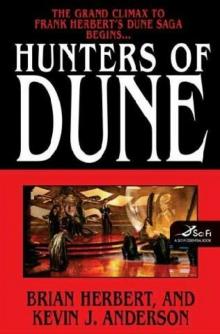 Hunters Of Dune
Hunters Of Dune The Tactful Saboteur
The Tactful Saboteur Soul Catcher
Soul Catcher God Emperor of Dune
God Emperor of Dune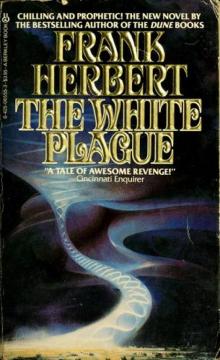 The White Plague
The White Plague The Green Brain
The Green Brain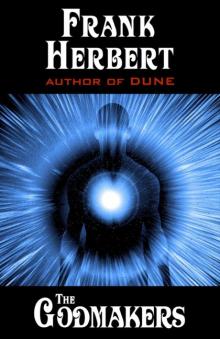 The Godmakers
The Godmakers Sandworms of Dune
Sandworms of Dune Destination Void
Destination Void The Dosadi Experiment
The Dosadi Experiment Eye
Eye High-Opp
High-Opp The Eyes of Heisenberg
The Eyes of Heisenberg Missing Link
Missing Link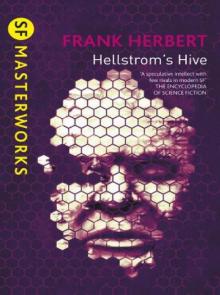 Hellstrom's Hive
Hellstrom's Hive Chapterhouse: Dune
Chapterhouse: Dune The Santaroga Barrier
The Santaroga Barrier The Dragon in the Sea
The Dragon in the Sea Operation Haystack
Operation Haystack A Thorn in the Bush
A Thorn in the Bush Four Unpublished Novels
Four Unpublished Novels Dune dc-1
Dune dc-1 Jorj X. McKie 1 - Whipping Star
Jorj X. McKie 1 - Whipping Star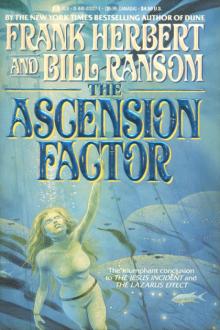 DV 4 - The Ascension Factor
DV 4 - The Ascension Factor Frank Herbert - Dune Book 4 - God Emperor Of Dune
Frank Herbert - Dune Book 4 - God Emperor Of Dune ChapterHouse: Dune dc-6
ChapterHouse: Dune dc-6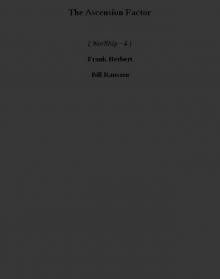 The Ascension Factor w-4
The Ascension Factor w-4 A Game of Authors
A Game of Authors Children of Dune dc-3
Children of Dune dc-3 Destination: Void: Prequel to the Pandora Sequence
Destination: Void: Prequel to the Pandora Sequence The Collected Stories of Frank Herbert
The Collected Stories of Frank Herbert Dune Messiah dc-2
Dune Messiah dc-2 Frank Herbert - Dune Book 5 - Heretics of Dune
Frank Herbert - Dune Book 5 - Heretics of Dune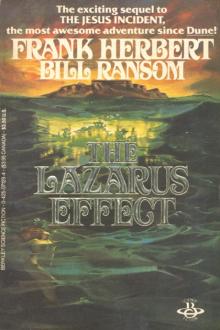 DV 3 - The Lazarus Effect
DV 3 - The Lazarus Effect The Jesus Incident w-2
The Jesus Incident w-2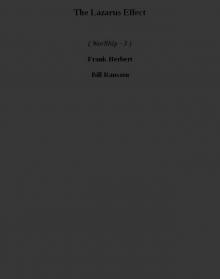 The Lazarus Effect w-3
The Lazarus Effect w-3 Frank Herbert
Frank Herbert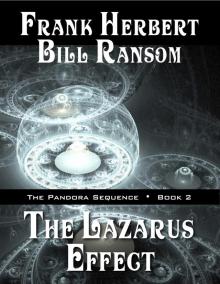 The Ascension Factor: Pandora Sequence
The Ascension Factor: Pandora Sequence Dune (40th Anniversary Edition)
Dune (40th Anniversary Edition) The Dosadi Experiment c-2
The Dosadi Experiment c-2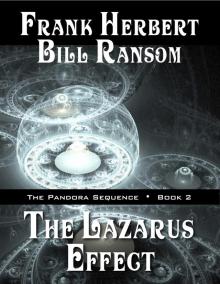 The Lazarus Effect
The Lazarus Effect God Emperor of Dune dc-4
God Emperor of Dune dc-4 The Pandora Sequence: The Jesus Incident, the Lazarus Effect, the Ascension Factor
The Pandora Sequence: The Jesus Incident, the Lazarus Effect, the Ascension Factor The Green Brain (v4.0)
The Green Brain (v4.0) The Heaven Makers (v4.0)
The Heaven Makers (v4.0) Heretics of Dune dc-5
Heretics of Dune dc-5